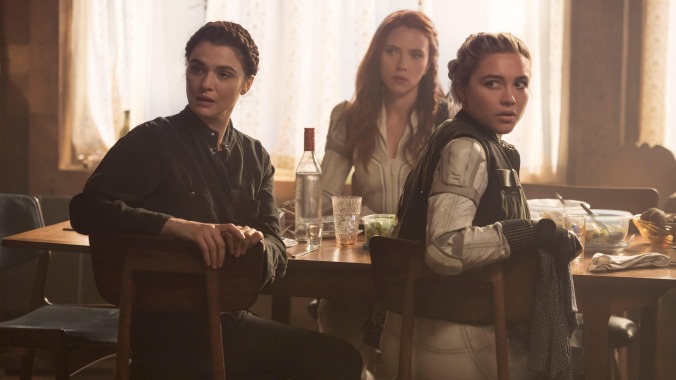Paging Dom Toretto: Black Widow's best parts are all about family
Although they're not related, Black Widow's core group of assassins sure acts like it


Families—chosen, biological, and whatever it’s called when gods are related to one another—abound in the Marvel Cinematic Universe. Black Widow, the long-awaited solo outing for Scarlett Johansson’s Natasha Romanoff, introduces a new variation on the theme, one that doesn’t really fit into any of the above categories. In the extended prologue that opens the film, we’re introduced to a foursome of undercover Russian spies straight out of The Americans: Mom (Rachel Weisz), Dad (David Harbour), and their two daughters—blue-haired, scrappy Natasha (Ever Anderson) and innocent, Americanized Yelena (Violet McGraw). By the time the title card appears and the music starts to swell, they’ve been separated. But the psychological impact of playacting as a happy family reverberates through the film.
As it turns out, none of them are blood, and all of them are pawns of the sinister Soviet intelligence agency known as the Red Room. After the “family” is forcibly torn apart on the runway of a top-secret Cuban air base, Natasha (Johansson) and Yelena (Florence Pugh) are forced to undergo the Black Widow program, which robs them of their agency and bodily autonomy while molding them into cold-blooded assassins. Suffice to say, a lot happens to Natasha in the meantime, until she meets Yelena again in the aftermath of Captain America: Civil War. And from the moment they’re reunited, they begin a relatable dance: The dynamic between responsible older sibling and bratty younger sibling.
Yelena’s dialogue is loaded with deadpan quips, which is typical for Marvel Studios. But her dry sense of humor comes from a place of genuine hurt and resentment, feeling as she does that Natasha could have done more to save her from a life of violence and coercion. Yelena teases Natasha about “that thing you do with the arm and the hair,” asks her if she wouldn’t rather be with her “other family” (a.k.a. The Avengers), and, perhaps most exasperating of all, criticizes Natasha’s driving. Deep down, though, she still wants her “sister’s” approval, and begs her: Can they please go on a globe-trotting revenge mission? Pleeeeease?
The rapport between Johansson and Pugh is one of the highlights of the movie, building to a daring mission where Natasha and Yelena break good ol’ pretend-pops, a washed-up superhero who goes by the name Red Guardian, out of a Russian prison. They’re en route to the isolated farmhouse where faux-mom, going by the name Melina Vostokoff, is enjoying the peace that is her reward for a lifetime of faithful service to the Red Room. And although she’s loath to admit it at first, Melina hangs on to her time in America—a period we’re led to understand only lasted for two or three years—as much as her government-assigned children and husband do. It’s the closest to “normal” that any of them have ever experienced, and they all miss it in their own way.
All this builds to a dinner-table scene that’s the emotional heart of the film, balancing comedy and pathos in a moment of respite between big, VFX-driven action sequences. No matter how old we get, no matter how much our relationships with our parents and siblings change, something happens when an entire family gets together. Everyone reverts to their old roles: The black sheep grows sullen and withdrawn. The youngest starts tugging on sleeves, looking for attention. Parents reach out to wipe food off of the cheeks of full-grown adults, and sternly warn about elbows on the table.
In this particular scenario, Harbour’s Alexi is the doting-yet-clueless dad who thinks he’s a lot more helpful than he actually is. Weisz’s Melina is fed up with having to do everything herself around here, even though she hasn’t taken care of Natasha and Yelena in decades. Johansson sulks, while Pugh needles and whines and tries to play her “parents” off of one another to get her way. Any minute now, someone’s going to storm off and slam a door, yelling about how they never asked to be assigned to this family in the first place.
Throughout her MCU arc, Natasha has been tortured by her past, becoming a hero to try to make up for the innocent blood she shed while under the control of the Red Room. But seeing her in the context of her family—however artificial and dragooned the formation of this killer clan might have been—reveals a new side of her, a wounded, neglected girl burdened with too much responsibility at too young of an age. We can try to run from our pasts, Black Widow proposes, but our inner child will always be there, crying out for attention and love. Even when you’re a superhero.